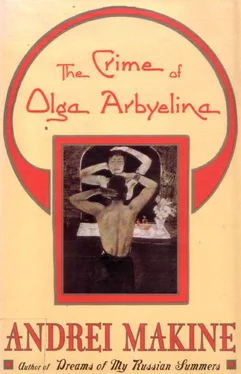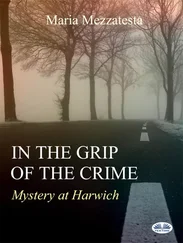She sensed that someone was coming, then heard his footsteps. She turned, and met his gaze; they understood it was pointless to exchange ritual questions. He stood beside her and watched the spinning of the snowflakes, detaching themselves from the gray sky and falling slowly toward the candle flame… They were already in flight as they drank a cup of quickly cooled tea, nibbled some bread, and wrote a note of thanks to Li. They both sensed, without putting it into words, that they had to be gone from the city in advance of the light, in advance of the crowds in the streets, in advance of the trampled snow… And when they collapsed, breathless, onto the seat of an empty car, in the first train of the morning; when she saw the young face opposite her in the twilight, his eyes closing, already weighed down with sleep, she understood, without wanting to understand, that this escape, this empty train, swaying as it clattered drowsily along, these windows blinded with snowflakes, the two of them with their deep abyss and even his still childlike hands, quivering slightly as he started to dream-all this was another life, the very first moments of which she was just discovering.
From now on it seemed to her that other people could understand her, though not because of the words she spoke. An object, she felt, a gesture, a scent would suffice. Back in January, during that lost time between the old and the new calendars, she had given the nurse at the retirement home a gray angora openwork shawl. The young woman had come to the library looking for accounts of the war, hoping, she said, to find in them some information about the place where her lover had died. Beneath the worn fabric of her woolen dress the shivering of her thin body was perceptible; and on her lips and in her eyes the fierce struggle between pride at having lived through such a beautiful and tragic love affair and humiliating fear at being suspected of lying… She had gone away, with the shawl around her shoulders, quite perplexed, not knowing what to make of this gift; and at that moment Olga had had a dizzying insight into this woman's life: the evenings in a poorly heated room, the tiny scrap of comfort the gray wool might bring to her body…
One day, after their return from Paris, she interrupted the old swordsman who had launched into his usual tale of fighting. She spoke very softly, as if to herself, of a carnival night long ago, in a great mansion at the edge of a forest; of a garden, all foaming with apple blossom. And of the young horseman who had suddenly appeared before a girl overcome with giddiness. It seemed to her that this man who for years had tirelessly been waving his arm about in imitation of saber fighting, this cutter-off of heads, was no different from that young horseman long ago in the midst of the garden at night. And that she needed to say to him very simply, "Forget the wars and the blood. I know you are haunted by the look of a man you killed. The eyes of a man who can already feel the blade cutting into his neck. And that to escape him you are forever calling out your 's-s-shlim' and laughing and frightening other people with your laughter. Forget. For in your own youth there must have been a night, meadows with cool grass, a garden white with flowers that you rode through on your horse…" The only words she actually uttered were: "night," "apple blossom," "white petals in the horse's mane…" It seemed to her that the face of the man listening to her was freed of its grimaces, became simple and serious. He never performed his swordsman act in front of her again.
From now on she perceived herself as being much closer to other people. Closer to the fields, to the nights, the trees, the clouds, the skies these people carried within them, that formed a silent language in which they could understand her without words. One day, with a joy that stung her brow as if peppered with grapeshot, she had this crazy hope: perhaps even what she was living through could one day be admitted?
Among the new messages, whose increasingly clear resonance she was now receiving, there was a night when all one could hear was the drowsy rhythm of rare, heavy drops trickling down from the mass of soft snow on the roof, splashing in a melodious cascade, close to the steps and under the windows. Her body, for several nights past, had learned to give itself, while seeming still, to avoid the brutal break, to preserve the slow settling of bodies that have taken pleasure… That night she found the rhythm of that silent separation. When his body was exhausted she felt his temple laid, for a moment, against her lips. A vein was throbbing, crazily. As she gave this involuntary kiss she sensed the pulsations gradually calming down…
Another occasion for her to speak to the being whose understanding she already hoped for came on that evening of the thaw. She made a mistake when examining the infusion, no doubt confusing the pollen of the macerated flowers with traces of the powder. He did not come… She waited for a long time, beyond what was already an unlikely hour, then, to break the spell of this waiting and to find sleep again, she got up, dressed, went out onto the steps.
The night was clear. The air was softer; scents, long imprisoned by the cold, were flowing readily, like the slightly bitter aroma of damp bark. The snow had been undermined by a multitude of invisible tricklings, still covert, that filled the night with an incessant peal of water drops. She felt she was moving forward across an endless musical instrument, snapping several strings at each sacrilegious step…
She stopped halfway between the house and the river, no longer wanting to disturb the melodious trembling of the slowly subsiding snows. Tilting her head back, she plunged in among the stars for a long time. A silent, unflagging wind descended from these nocturnal depths. She staggered, suddenly exalted, her eyes looked around for support. The shadow of the wood, the dark reflection of the water, the dim fields on the opposite bank. The sky from which spilled the powerful and constant wind. All this lived, breathed, and seemed to see her, to be focusing some kind of infinite gaze upon her. A gaze that understood everything but did not judge. It was there, facing her, about her, within her. Everything was said by this immense wordless, motionless presence… The wind was still blowing from the summit of the sky, from its dark reaches scarcely marked with the buoys of stars. She was responding to the eyes staring at her, impassive eyes, but whose absolute compassion she sensed…
She went home with the feeling of descending slowly from a very great height. Moving forward, she sought unconsciously to tread in the footprints left from her outward journey, so as not to snap any more strings. Up on the steps she cast a glance behind her: on the stretch of snow a string of footprints led out into the night with no return. And when she looked up a powerful gust of wind, falling vertically, struck her eyelids.
One evening she noticed that the great pile of snow that had accumulated behind the wall of their house had shrunk into a grayish sponge around which the glistening, naked clay of the earth lay uncovered. Confused feelings gripped her: this exhaustion of the cold was quite natural, quite expected, but at the same time heavy with hidden menace. Was the winter (their winter!) now going to be woven imperceptibly back into the indifferent round of the seasons? This very normality seemed at once salutary and fraught with vague dangers… A few days later when she was clipping together the newspapers that the postman had once more started delivering to the Caravanserai after several months of eclipse, she came upon this headline: rhine ice dynamited to open way for shipping delayed by unprecedented frosts. Strangely, her heart missed a beat and she heard a little silent cry: "But why all this hurry?"
Читать дальше












